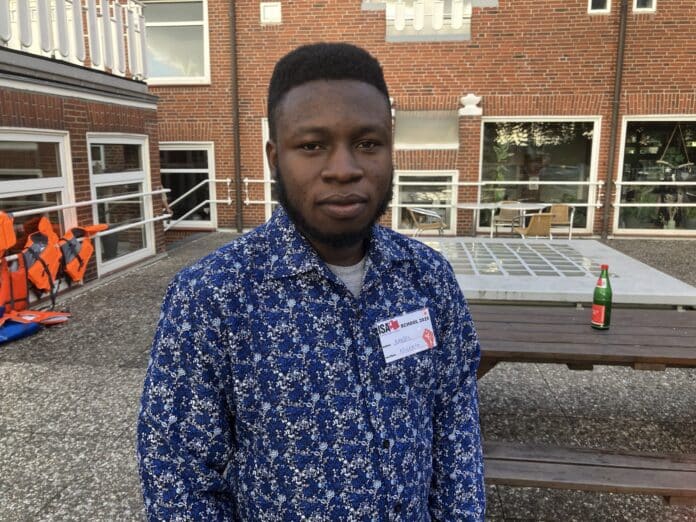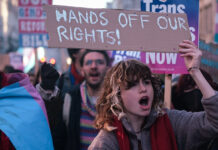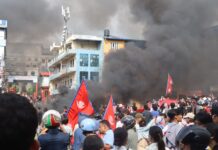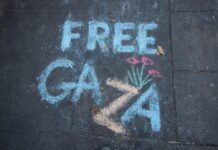“We were 49 in my cell”
ISA reporters
(This article was first published on 7 August 2025)
This week it is one year since the massive #EndBadGovernance protests in Nigeria. The government’s full-scale attacks on workers and the poor were met with mass anger.
The state answered with sharp repression. More than one thousand were arrested, among them Daniel Akande and ten other activists accused of being the main organisers in Abuja, the country’s capital.
Over the last year ISA has conducted an international solidarity campaign with the demand that all arrested should be released and all charges dropped. Hundreds of protest letters have been sent to the Nigerian police and government, including from trade unions. Public protests have been organised, including at Nigerian embassies. These solidarity activities have strengthened the campaign. Above all, they have raised awareness about the attacks from the government and imperialist agencies such as IMF in Nigeria, as well about the struggle from below.
The trial against Daniel Akande and the other ten activists has been postponed three times already, latest in the end of June. The new date is now 8 October. To give background information, we interviewed Daniel Akande at the ISA school in Germany last week.
Why were you arrested?
Because of the role I played in the protests in early August. The movement had huge significance and had sharp demands against the government’s attacks.
On 29 May, 2023 at his inauguration, the new president, Tinubu, declared a war on the mass of the working class, declaring “the era of subsidies is gone”. The price of fuel for transport and electricity generators increased 800%. Food prices doubled. It meant war on the livelihoods of working people.
At the same time, trade union leaders negotiated with the government which resulted in a new minimum wage, 70,000 naira (40 euro) per month, which can in no way cover the basic necessities. This figure is far lower both in value and its purchasing power compared to the previous N30,000 (70 euro) under the Buhari regime with the currency now more than 200% devalued. The government also introduced a student loan scheme, alongside an outright commercialisation of education that will price out working class students.
The government feared the coming protests and worked hard in advance to stop them. In the few days leading up to the protests they handed out 82 million Naira to individual youth leaders, religious leaders and others, asking them to make sure people would not attend. This had no effect, the masses came out, decisively. The first day of protest had effects like a general strike, closing most economic activity and transport. There was no doubt about the overwhelming opposition to the government’s attacks.
Who were arrested?
The government was determined to stop the protests. On the second day the first organiser was arrested, followed by further arrests the following days. They arrested ten activists that had mobilised, spoken at the protests and to the media. After little more than a week, the ten arrested activists were accused of treason and declaring war on the government, with death sentences as the ultimate possible verdict.
I knew the police were looking for me. Almost a month later, Sunday 1 September, five policemen arrested me in my local church. They took me to New Nyanya police station in Karu Local Government Area, Nasarawa state. From there I was transported to Intelligence Response Team, Abuja, where I was in an underground cell for 21 days.
I was not told of any accusations until 27 September, one day before my case was taken to court. I was to be added to the case of the ten activists, facing the same charges and threatened with a death sentence. The court decided to send me to prison, awaiting full trial. The prison was Kuje Correctional Center.
How were conditions in prison?
They were horrific. We were 49 in one cell, so there was no space. The first night I slept on the floor next to the open toilet. When someone left the cell, I could gradually move away from the toilet, of course replaced by new inmates in my previous position. Trying to sleep was only possible laying on my left or right side, there was no space to sleep on my back. The air was polluted, I had problems breathing. The food was not food, just water with some spices, beans without a single seed of beans in it.
The other prisoners in my cell included some people the police thought had money and therefore could pay to be released. Others were small criminals. I met three security guards accused of stealing. They had been in prison three months without being charged and one of them had been bitten by a snake in their cell. None of the other ten activists were in the same cell as me.
My wife and comrades visited me, and arrangements were made to get me food. My lawyers had to pay the police to visit me and to deliver anything. Despite all the support, I left prison seriously ill and malnourished. I had malaria, pneumonia, several infections and been bitten by small insects under my skin. I still have scars from that. I needed immediate health care treatment and support.
I was released on 14 October, after one and a half months. The release of us, the eleven activists, was a result of the strong solidarity campaign internationally and in Nigeria itself.
What effect has the continuously postponed trials had?
I think the best for the government would be to silently dismiss the case. It seemed this was on its way this spring when we got back our phones and items that had been confiscated.
But the government also wants to silence protesters, to show how they treat organisers and alternative ideas. They want to spread fear among all that want to protest. For us eleven, they want to block us from speaking.
The police had no real knowledge about us. One of the accused activists is called Michael Lenin, and they found his name in my phone. This is the weak basis of the accusations that the organisers have Russian links, since “Lenin is a Russian name”. They have no other ground or facts.
The attacks have also hit the trade unions, with raids in the offices and a union leader beaten up by police. The unions have announced three or four general strikes in the last year, reflecting the mood from below, but postponed all of them after offers of negotiations. We argue and demand that they call a 48 hour general strike, but also take part in building a political alternative to the corrupt capitalist parties. The working class needs its own organsations, armed with a socialist program against capitalism and imperialism.
The previous prosecutor in our case was removed, himself accused of corruption, and will be on trial in the same court as us. The charges against well-known activist Omoyele Sowore, who was arrested and detained for 45 days in 2019 with similar accusations of treason were finally withdrawn after more than four years.
The accusations against us will not prevent new protests, and are instead a source of more discontent against the government.




